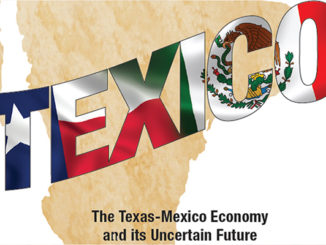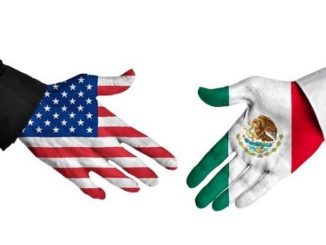
by Claude Barfield
In the modern era, Republicans have espoused free trade — and free trade agreements (FTAs) — as extensions of their domestic goals to foster vigorous market competition and limit government intervention on behalf of favored protectionist interests. To carry forward that tradition, even in the face of the current bitter partisan divide, Republicans in Congress must take the lead in granting President Obama the authority to conclude new FTAs and get an expeditious decision on the agreements from Congress. Specifically, this means passage of so-called Trade Promotion Authority (TPA) legislation that provides: (1) authority from Congress to the President to enter into specified trade negotiations; and (2) congressional procedural rules that establish an expedited legislative approval process for the resulting agreement(s). Previous TPA authority lapsed in 2007.
After dawdling for three years, President Obama in 2011 finally threw his support behind the three FTAs with Korea, Colombia and Panama that his administration inherited from the Bush administration. To his credit, the president has pushed since then to complete negotiations of the much more significant Trans-Pacific Partnership Agreement (TPP), and more recently the Trans-Atlantic Trade and Investment Agreement (TTIP). After 19 sessions of hard bargaining over the last three years, TPP negotiations are reaching a crucial endgame. Thus, passage of TPA renewal is now an urgent priority.
The congressional politics of TPA passage and subsequently of approval of TPP and TTIP remain dicey – as they have been since the huge debate broke out over the North American Free Trade Agreement in the early 1990s. While Republicans in Congress are relatively united on these issues (see below), the Democratic party remains badly divided on trade policy – not least because of the continuing, adamant opposition to most trade agreements by labor unions and many environmental groups.
The House of Representatives is the key barometer on trade policy votes, first, because it has initial constitutional power over revenue (trade) bills and second because with two-year terms and smaller boundaries House members must pay close heed to local interests. With these realities in mind, it should be noted that though President Clinton strongly supported NAFTA, he did not carry the majority of House Democrats when the agreement came before Congress: 102 ayes; 156 nays. This pattern has carried forward down to the Obama administration. Though the president finally got behind the Korea, Colombia and Panama agreements, his lobbying efforts signally failed to persuade most House Democrats who voted 59-130 against the Korea FTA; 31 to 158 against the Colombia FTA; and 66 to 123 against the Panama FTA.
More to the point for this essay, recently 151 House Democrats signed a letter to President Obama opposing TPA authority in its present form, stating “‘Fast Track” (TPA) is simply not appropriate for 21st century agreements and must be replaced.” As the administration has not signaled that it wants dramatic changes in TPA provisions, most of these Democrats will almost certainly oppose the legislation when it comes before them.
House Republicans: though divisions among House Republicans are notorious in recent years, driven by the rise of the Tea Party, on trade policy a durable consensus still obtains. Though there were predictions that Tea Party House Republicans would be suspicious of globalization and open trade after the 2010 election, just the opposite occurred: Tea Party House members viewed trade agreements as furthering their goals to downsize government and deregulate markets. Thus, in 2011, they voted overwhelmingly for the pending FTAs, as did most establishment House Republicans (only 8 of 89 House Republican Freshman voted against Colombia and Panama, and only 7 voted against Korea).
Despite this record, TPA reauthorization does present new issues for some House GOP members, particularly for the more conservative Tea Party-affiliated congressmen. Recently, twenty-two House Republicans signed a letter opposing TPA. This is a relatively small percentage of House Republicans (and of Tea Party House Republicans); but opponents are stepping up their campaign, and thus need to be answered.
Two arguments explain the incipient dissent: one, though not stated openly, is a reaction against giving any kind of victory to the Obama administration; and two, on more substantive grounds, broader constitutional arguments have been raised against TPA as ceding congressional power to the executive and eroding national sovereignty. As for the personal and political distaste for giving Obama a victory, opposition to TPA – and thus, by extension ratifying TPP and TTIP – for Republicans is akin to the proverbial “cutting off your nose to spite your face.” Ultimately, a defeat for TPP and TTIP, if and when they come before Congress, would represent a defeat for longstanding Republican policies and principles and a victory for those elements of the Democratic party that are deeply suspicious of globalization and global free enterprise (The Elizabeth Warren wing of the party would be ecstatic).
On the constitutional questions, despite claims from anti-global activists on the left (and right: viz., Pat Buchanan and Clyde Prestowitz), conservative judicial experts have consistently defended the limited grant of authority on trade from Congress to the Executive as within the bounds of the division of powers envisioned by the Founding Fathers.
They make two points: first, through the TPA process, Congress exercises the power to dictate specific negotiating goals, and it mandates constant consultations with congressional leaders during the course of extended bargaining sessions. Second, and of paramount importance, Congress through TPA reaffirms that the provisions of trade agreement cannot force changes in US domestic law. Legislation implementing trade agreements all contain the following language:
“No provision of the Agreement…which is inconsistent with any law of the United States shall have effect.”
“Nothing in this Act shall be construed…to amend or modify any law of the United States…unless specifically provided for in this Act.”
A decade ago when similar questions were raised about the constitutionality of similar trade legislation, two legal experts with impeccable conservative credentials – former Attorney General Edwin Meese and Judge Robert Bork – both endorsed the Executive-Legislative partnership on trade agreements. As Bork wrote at the time: “No treaty or international agreement can bind the United States if it does not wish to be bound. Congress may at any time override such an agreement or any provisions of it by statute.”
As Meese and Bork affirm, US sovereignty and congressional prerogatives are not threatened by TPA or the proposed new trade agreements. Thus, Republicans should get on with the job of reaffirming their traditional commitment to open markets and vigorous international competition.
Claude Barfield is a former consultant to the office of the U.S. Trade Representative and a resident scholar at the American Enterprise Institute.



